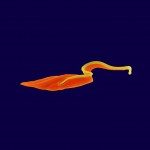Lien vers Pubmed [PMID] – 26871910
PLoS Pathog. 2016 Feb;12(2):e1005448
African trypanosomes thrive in the bloodstream and tissue spaces of a wide range of mammalian hosts. Infections of cattle cause an enormous socio-economic burden in sub-Saharan Africa. A hallmark of the trypanosome lifestyle is the flagellate’s incessant motion. This work details the cell motility behavior of the four livestock-parasites Trypanosoma vivax, T. brucei, T. evansi and T. congolense. The trypanosomes feature distinct swimming patterns, speeds and flagellar wave frequencies, although the basic mechanism of flagellar propulsion is conserved, as is shown by extended single flagellar beat analyses. Three-dimensional analyses of the trypanosomes expose a high degree of dynamic pleomorphism, typified by the ‘cellular waveform’. This is a product of the flagellar oscillation, the chirality of the flagellum attachment and the stiffness of the trypanosome cell body. The waveforms are characteristic for each trypanosome species and are influenced by changes of the microenvironment, such as differences in viscosity and the presence of confining obstacles. The distinct cellular waveforms may be reflective of the actual anatomical niches the parasites populate within their mammalian host. T. vivax displays waveforms optimally aligned to the topology of the bloodstream, while the two subspecies T. brucei and T. evansi feature distinct cellular waveforms, both additionally adapted to motion in more confined environments such as tissue spaces. T. congolense reveals a small and stiff waveform, which makes these parasites weak swimmers and destined for cell adherence in low flow areas of the circulation. Thus, our experiments show that the differential dissemination and annidation of trypanosomes in their mammalian hosts may depend on the distinct swimming capabilities of the parasites.

